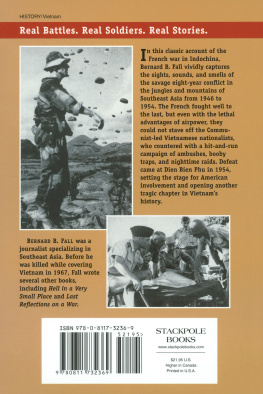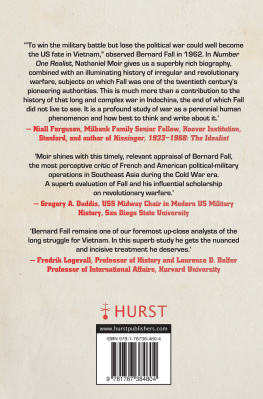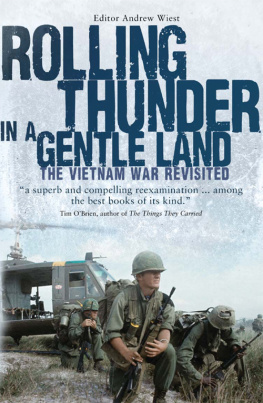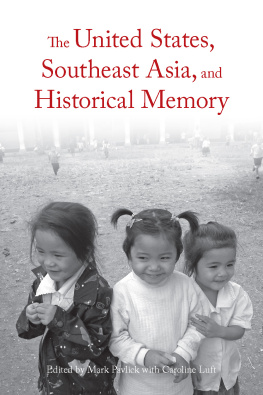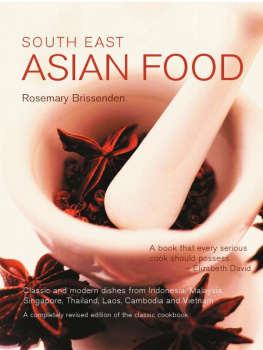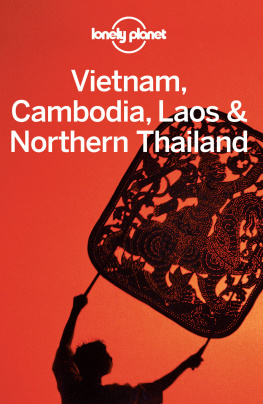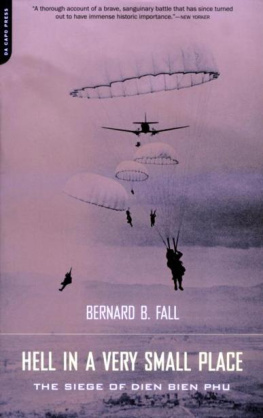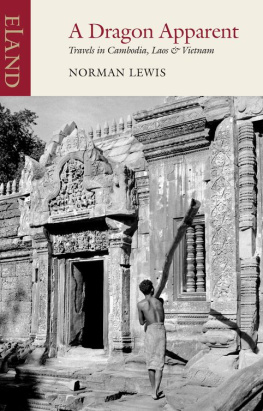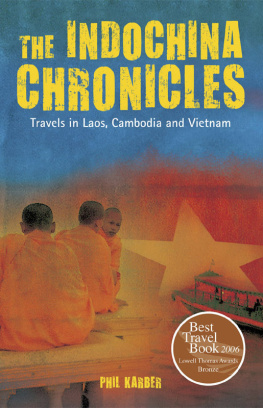STREET
WITHOUT JOY
Praise for Street Without Joy
Mr. Falls book is a dramatic treatment of a historic event.
It is recommended reading.
The New York Times Book Review
A poignant, angry, articulate book.
Newsweek
Military history at its best.
Chicago Sunday Tribune Magazine of Books
Definitive military history of the Indochina conflict
The New Republic
STREET
WITHOUT JOY
The French Debacle in Indochina
Bernard B. Fall
Introduction by George C. Herring
STACKPOLE
BOOKS
New material copyright 1994 by Stackpole Books
Copyright 1961, 1963, and 1964 by Bernard B. Fall;
renewed in 1989 by Dorothy Fall
Published in paperback in 2005 by
STACKPOLE BOOKS
5067 Ritter Road
Mechanicsburg, PA 17055
All rights reserved, including the right to reproduce this book or portions thereof in any form or by any means, electronic or mechanical, including photocopying, recording, or by any information storage and retrieval system, without permission in writing from the publisher. All inquiries should be addressed to Stackpole Books, 5067 Ritter Road, Mechanicsburg, PA 17055.
Printed in the United States of America
10 9 8 7 6 5 4
Originally published in 1961 by The Stackpole Company
Art by Dorothy Fall
Maps by Bernard B. Fall
ISBN 0-8117-3236-3 (paperback)
ISBN 978-0-8117-3236-9
The Library of Congress has cataloged the hardcover edition as follows:
Fall, Bernard B., 1926-1967.
Street without joy / Bernard B. Fall ; introduction by George C. Herring.
p. cm.
Originally published: Harrisburg, PA: Stackpole Co., 1961.
ISBN 0-8117-1700-3
1. Indochinese War, 1946-1954. I. Title.
DS553.1.F35 1994
959.8035dc20
93-34825
CIP
TO THOSE WHO DIED THERE
Be men. If you are Communists, go and join the Viet-Minh.
There are people there who fight well for a bad cause.
Marshal de Lattre de Tassigny,
Commander-in-Chief in Indochina,
in an address to Vietnamese high
school graduates, July 11, 1951.
Anti-Communism will remain a useless tool in our hands
as long as the problem of nationalism remains unsolved.
Marshal Philippe de Hautecloque Leclerc,
Commander-in-Chief in Indochina, 1945-47.
The Peoples army is the instrument of the [Communist]
Party and of the revolutionary State for the accomplishment,
in armed form, of the tasks of the revolution
Vo Nguyn Giap,
Viet-Minh Commander-in-Chief,
in Peoples WarPeoples Army,
Hanoi, 1961.
MAPS AND ILLUSTRATIONS
Night Patrol
Bernard B. Falls Street Without Joy is one of a handful of truly classic accounts of the wars in Indochina. Originally published in 1961, just as the Kennedy administration was escalating the war in Vietnam, it attracted little initial notice in the United States. By 1967, however, when the United States was engaged in full-scale war and Fall himself had been killed reporting combat in the very area he had written about, it had become standard reading for the U.S. officer corps in Vietnam. It remains today perhaps the best English account of Frances frustrating and ultimately unsuccessful effort to subdue the Vietminh insurgency.
Bernard Fall came naturally by his chosen profession as a student of war. He grew up in France against the backdrop of World War II, lost both parents in that conflict, and by his own recollection experienced his first whiff of war at age twelve. As a teenager, he joined the resistance, and he fought with the Allies in the liberation of France and the drive toward Berlin.
He later conceded that he became a specialist on Indochina by sheer accident. While he was studying for his doctorate at Syracuse University, one of his professors suggested that he might focus on the area because French was his native language and because no one else was doing it. He thus went to Indochina in 1953 at his own expense to research a doctoral dissertation on the Vietminh revolutionaries (later published as The Vietminh Regime). While there, he often accompanied French troops on operations in the field, and his letters to his wife recounting his experiences provided the basis for Street Without Joy.
Thus began what he would call his bad love affair with Indochina, an obsession that would earn him the reputation as one of the worlds foremost authorities on the area. He would return there numerous times. Other books followed Street Without Joy, including, most importantly, The Two Vietnams: A Political and Military Analysis (1963) and his epic account of the dramatic battle of Dienbienphu, Hell in a Very Small Place (1966).
Fall brought to his work enormous energy and a powerful intellect. A brash and flamboyant individual, well built and of medium height, he cut a dashing figure in his chosen role as a war correspondent in Vietnam. He aspired to be a great writer, and he had a rare talent for languages. His zest for digging out facts through research in the field made him contemptuous of those who wrote about wars from the comfort and safety of their studies. Intense and hard-working, he became like one possessed, according to his wife, after he was diagnosed with a rare, incurable disease. He returned to Vietnam in 1967 certain that his days were numbered. While accompanying U.S. Marines on a mission in what he called my area, the street without joy north of Hue, he was killed by a land mine.
Fall prided himself on being an independent scholar. Although he was a major contributor to the bitter debate on Vietnam that wracked the United States in the 1960s, he usually stood above it. Highly critical of what he regarded as Americas abandonment of France in the First Indochina War, he was sometimes dismissed as an apologist for his native country. Yet he harshly criticized French colonialism and French strategy and tactics. An admirer of Ho Chi Minh and the Vietminh, he was firmly anti-Communist. Neither hawk nor dove, Fall rejected both escalation and an American withdrawal as inadequate responses to the complex situation wrought by French and American intervention in Vietnam. He was, however, sharply critical of an American policy that, he believed, was based on abstractions divorced from the realities of Vietnamese history and compromised by chronic and usually unwarranted optimism. He developed a deep and abiding empathy for the victims of the wars in Vietnam, especially for the common soldiers who fought on all sides. He remained a French citizen, but he felt great affection for his adopted countries, Vietnam and the United States. Although a critic of U.S. policy in an era when criticism was not welcomed and thus, in his own words, the unwelcome bearer of ill tidings, he became a person of considerable influence, his works avidly read by both those Americans who fought in the war and those who protested against it.
Street Without Joy does not pretend to provide a comprehensive account of the First Indochina War. It focuses almost entirely on the period after 1950 when Chinese and American intervention had both enlarged and internationalized the conflict. It is episodic, singling out for special attention a series of major French operations between 1951 and 1954, Operation Lorraine in the Red River Delta, Operation Camargue, a 1953 effort to clean up the Vietminh-infested area known by French soldiers as the street without joy, the disaster that befell Groupement Mobile No. 100 in the Central Highlands of Annam, and the battle of Dienbienphu.

